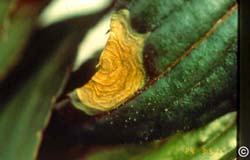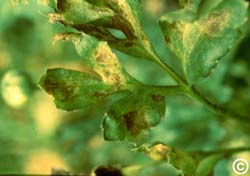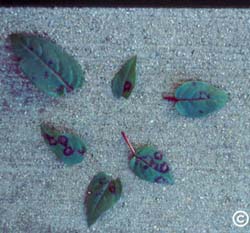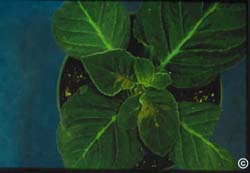Like any living system, plants are susceptible to viral diseases. Plants have cell walls which protect them from viruses entering their cells, so some type of damage must occur in order for them to become infected. Testing for viruses in plants is costly, so diagnosis often is based on symptoms.
What are symptoms of plant viruses?

Some common symptoms include mottling or mosaics (expressed as a variegated pattern of yellow and green on the leaf, fruit or flower), curled or distorted leaf tissue (feels thick and rigid even though the plant appears wilted), stunting and distortion, (abnormally shortened or deformed leaves, stems or fruit), ring spots (wavy rings or lines of yellow, white or red throughout leaf tissue) and cankers (blackened areas or black streaks appear on stems).
How do plant viruses spread?
 Viral particles won’t survive outside its host tissue. That means they need a vector to move from one plant to another. Vectors include insects, and pruning and propagating tools that move sap from one plant to another. Viral particles also can be moved through other plant parts such as seeds, pollen or the plant itself. When viruses are passed between plants, it is called horizontal transmission. When they are passed from parent plant to the offspring, it is called vertical transmission.
Viral particles won’t survive outside its host tissue. That means they need a vector to move from one plant to another. Vectors include insects, and pruning and propagating tools that move sap from one plant to another. Viral particles also can be moved through other plant parts such as seeds, pollen or the plant itself. When viruses are passed between plants, it is called horizontal transmission. When they are passed from parent plant to the offspring, it is called vertical transmission.
What are common plant viral diseases?

Common viral diseases in landscaping plants are rose mosaic virus and peony ring spot. Some viruses that infect agricultural food plants include the name of the plant they infect such as common bean mosaic virus and tomato spotted wilt virus. Rose mosaic virus is transmitted by sap, while tomato spotted wilt is transported by western flower thrips. Not all viruses are deadly, but over time, they often debilitate a plant. For example, rose mosaic virus often makes plants more susceptible to winter injury. Some plant viruses are not limited to one particular plant host, but may infect different varieties of plants. For example, tomatoes, peppers, cucumbers and tobacco may all be infected by tobacco mosaic virus.
How can I control plant viruses?
 Unfortunately, there is no chemical control for viral disease. To control plant viruses, try to remove symptomatic plants and control the insect vector, if appropriate. When working with multiple plants, it’s always best to clean pruning and propagating tools to avoid “passing” the virus from one plant to another. Grow resistant crop varieties and use virus-free planting material.
Unfortunately, there is no chemical control for viral disease. To control plant viruses, try to remove symptomatic plants and control the insect vector, if appropriate. When working with multiple plants, it’s always best to clean pruning and propagating tools to avoid “passing” the virus from one plant to another. Grow resistant crop varieties and use virus-free planting material.
For more information, see the following Colorado State University Extension fact sheet(s).


